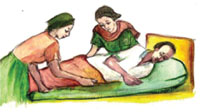3.7 Care for a person with advanced cancer
As you have seen in previous sections, cancer may be treatable if it is diagnosed early and depending on its type. However, some cancers are untreatable and others are diagnosed too late for treatment to be effective. If the original cancer spreads to other part of the body, the secondary tumours can damage the function of many different organs and make the patient very sick. As the cancers grow, they can interfere with processes that maintain life and the patient becomes terminally ill (i.e. expected to die within weeks).
The care given to a person who has advanced cancer (or any other chronic life-threatening condition) is referred to as palliative care. The aim of palliative care is to improve the quality of life of the sick individual and their family in the period before the death, and to help the family cope with the bereavement after the death. It involves prevention and relief of suffering, pain and other physical problems, and attention to psychosocial and spiritual issues. It focuses on supporting the patient to enjoy what remains of their life as fully as possible, and helps them and their family to manage symptoms such as pain and nausea. It also helps the relatives to cope with the overwhelming feelings they may be experiencing about losing their loved one.
The aim in palliative care is always to support the patient in their own home for as long as possible, and to involve others in the community who can give comfort to the patient and family members. In Ethiopia, an important contribution can be made by religious and spiritual leaders in the community. Don’t forget that families who are caring for a dying person also need practical help and support, for example to lift a bedridden patient to change the bedding or make the person more comfortable (Figure 3.7).

Please refer to the Communicable Diseases Module, Part 3, Study Session 30 for a detailed description of palliative care in relation to people dying from HIV/AIDS. However, all the aspects described are equally relevant to someone who is dying from cancer, heart disease or any other chronic condition – for example, chronic obstructive pulmonary disease or bronchial asthma, the subjects of the next study session.
3.6.1 Cervical cancer screening
